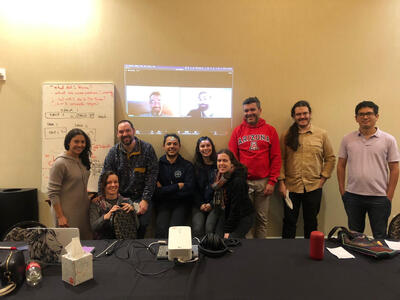In and around the Department of Linguistics in the next week:
- Fieldwork Forum - Wednesday Jan 18 - Dwinelle 1303 and Zoom (password: fforum) - 3:10-4pm
Melissa Gomes (UC Davis): "Konkani in America: A Mixed Methods Approach to Understanding Heritage Language Maintenance." - Phorum - Friday Jan 20 - Dwinelle 1229 - 3-4:30pm
Sarang Jeong (Stanford): "The relation between perception and production in an ongoing sound change: A pilot experiment on the younger group's perception of Korean three-way stop contrast." - Syntax and Semantics Circle - Friday Jan 20 - Dwinelle 1303 and Zoom - 3-4:30pm
Line Mikkelsen (UC Berkeley): "Hyperraising to object in Kalaallisut."


